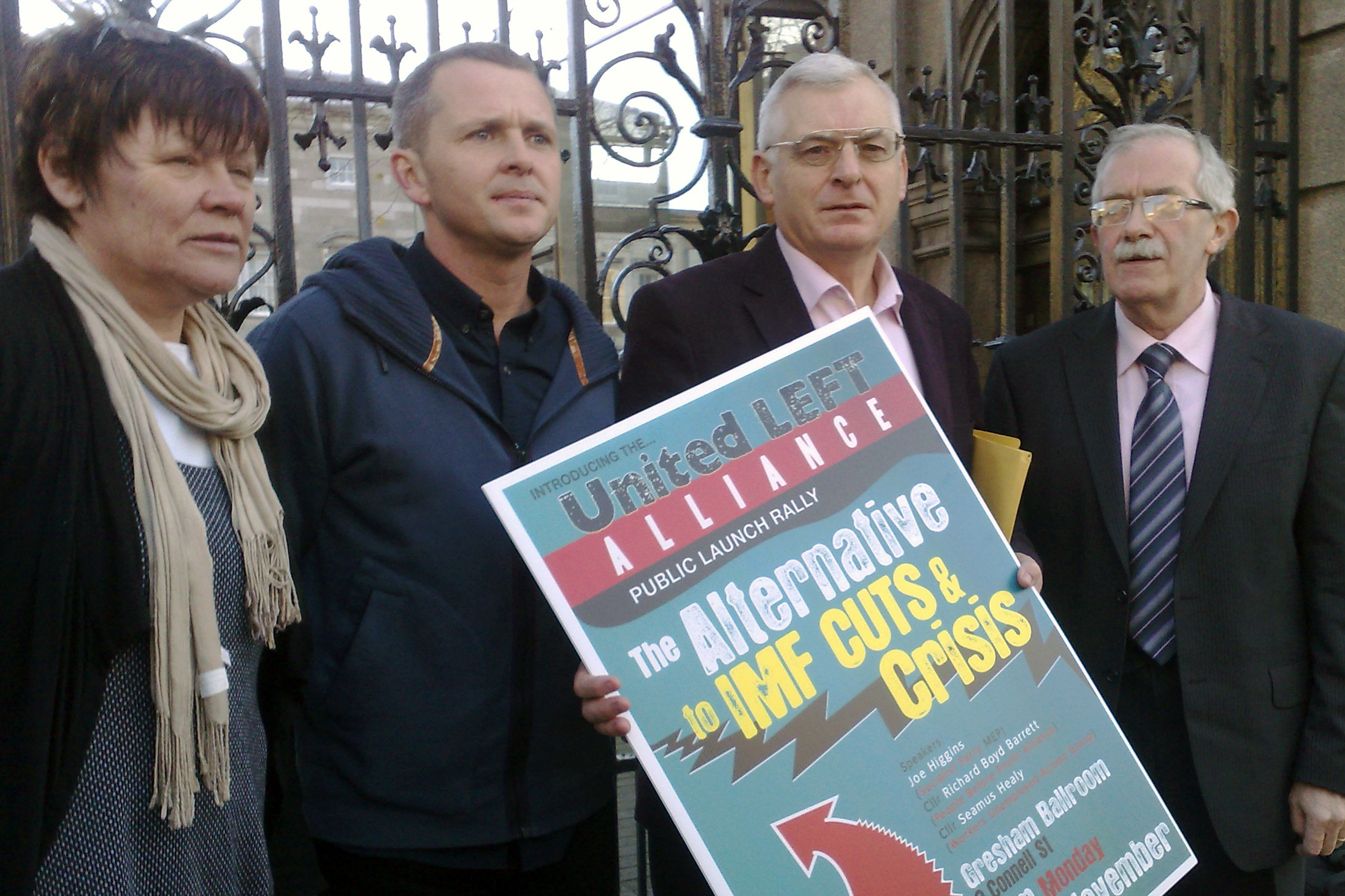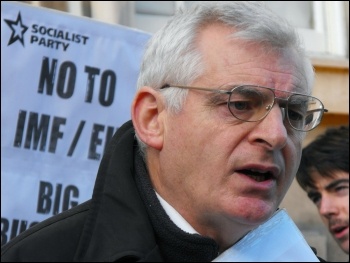Hopes and fears in the upcoming Irish election: Socialist Party support increasing amongst working class
THE IMMINENT general election in the Irish Republic was called because the dominant coalition party – Fianna Fáil – collapsed out of office in utter disarray. 14 years of its rule in the interests of major developers and bankers has bankrupted Ireland, causing mass unemployment, drastic reductions in take home pay, and forcing tens of thousands of young people to emigrate.
Socialist Party reporters, CWI Ireland
Only three and a half years ago Fianna Fáil won just under 42% of the vote but now they are hovering around 16%. Their coalition ‘mudguard’ – the Greens – are floating anywhere from 3% to 1% in the polls.
The Socialist Party has nine of the 20 United Left Alliance (ULA) candidates, standing in nearly half the constituencies throughout the country. Pundits are predicting that the Socialist Party-initiated ULA could win four or five seats.
The Socialist Party is particularly challenging for seats in Dublin North with councillor Clare Daly, Cork North Central with councillor Mick Barry and in Dublin West with Joe Higgins MEP.
An Irish Times poll regarding Cork North Central published on 14 February illustrated the tremendous growth in support for Mick Barry to 13%, over 9% up on his 4% in 2007.
Bankruptcy
The strongest feature in the election is the public’s hatred of Fianna Fáil and the shock at the state of the country. Paradoxically, so established is it that Fianna Fáil has lost the election that on a few occasions their new leader Micheal Martin has been able to pose as the opposition in the campaign! But to no avail in terms of public support however.
The latest opinion poll on 13 February even suggested that the capitalist opposition Fine Gael party could get an overall majority, which no party has had since 1977, or could rule on the basis of the support of right-wing Independents.
The poll results showed Fine Gael on 38% (up three percentage points), Labour 20% (down two), Fianna Fáil 15% (down two), Sinn Féin 10% (down three), Greens 3% (up one) and Other/Independents 14% (up three).
The election has understandably been dominated by the economy and related issues.
The first two weeks of the campaign saw the media attack the idea that the debts should not be paid, arguing a default would mean a gaping budget deficit and immediate financial collapse as the EU/IMF and the money markets would refuse Ireland credit. Clearly the establishment is fearful of the public anger that exists toward the bankers, speculators and ruling elite.
The reality is that bankruptcy is guaranteed on the basis of the EU/IMF austerity deal struck with the Fianna Fáil coalition government. It will suck €16 billion out of the economy making the crisis and indebtedness worse. This year €4.8 billion was paid in interest alone, by 2014 it’ll be €10 billion or more than 20% of total state revenue!
Employment has been lost in the media debate but is the biggest issue in the election. None of the establishment parties have any policy or plan on job creation, they are simply waiting and hoping for the capitalist market and private investment to recover. This won’t be anytime soon as investment collapsed last year by 31%. Only democratic public ownership of wealth and socialist planning of the economy can offer a way forward.
However, there are fears about the economy and a sovereign debt default, reflected in the doorstep canvassing, with many people agreeing with our analysis but hesitant about committing their support. The slight drop off in support for nationalist Sinn Féin in recent opinion polls probably reflects these fears.
Outcomes
Labour has been stalled in the polls since last November when it became clear they were prepared to accept the parameters and constraints of the four-year IMF/EU deal. However, it is possible that they could rise again now as people, fearful about the economy and the possibility of Fine Gael ruling alone, may feel Labour in power could alleviate some of the worst effects of the crisis.
The United Left Alliance has been a very timely initiative and is seen as a very important development by left leaning workers and youth. The conditions have been difficult for it to develop a broader momentum at this point but success in electing a number of TDs could open up explosive potential in the months and years ahead.
The election hasn’t been easy but at base there is huge anger about the crisis and the austerity and we are confident that will be shown on election day.
The increase in support for the party in Cork North Central is a bigger increase than either Sinn Féin or Labour achieved. The Irish Times poll means Mick Barry has a chance of winning and we are pitted now in an intense battle with a Fianna Fáil minister in that seat. Here and in the other areas we will go all out to try and achieve a decisive breakthrough on 25 February.
THE SOCIALIST Party is standing nine candidates in the Irish general election, the highest number in the party’s history.
Dublin South West – Mick Murphy
Thirty people have been active in the campaign and we are getting a very good response in the areas where we are based. It is harder going in the other parts of the constituency, where the national momentum to Sinn Féin and Labour is felt more.
Six different versions of billboards will be put up this week dealing with key issues. 42 attended the launch meeting on 7 February and five of the new people there are now active in the campaign.
Carlow Kilkenny – Conor MacLiam
Conor is getting significant national media, particularly in the newspapers. Conor’s partner Susie Long died of cancer in 2007. Susie’s diagnosis was delayed for seven months because she was a public patient, and she and Conor went public on the scandal. This had a huge impact nationally.
Conor is featuring opposition to ‘apartheid’ health care as a key part of his campaign.
50 people attended the launch meeting in Carlow and 60 attended in Kilkenny.
Dublin West – Joe Higgins
There has been a good response on the doorsteps and an understanding of the importance of Joe Higgins being returned to the Dáil (parliament) after losing out in 2007.
We are now in the crucial week of the campaign. The plans for the canvass are being ratcheted up, hundreds of new posters will be put up as the manifesto will be dropping through the doors.
In a local school debate Joe got more than twice the vote of the second candidate, Labour.
Dublin North – Clare Daly
This is geographically a massive constituency with many different towns. Within a day of the election being called the campaign had 900 large posters strapped to lamp posts.
The canvass has been going well. Clare is seen as a very effective fighter and campaigner in the communities and is seriously challenging for a seat.
Cork North Central – Mick Barry
Mick is a real challenger for a seat in this constituency, which elects four TDs. He has a long record as a working class fighter and is very well known. On the first day of leaflet distribution, 45 activists turned out to help.
- Other Socialist Party candidates are: Cian Prendiville in Limerick City, Brian Greene in Dublin North East, Ray Fitzpatrick in Laois Offaly, and Rob Connolly in Dublin Mid West.










